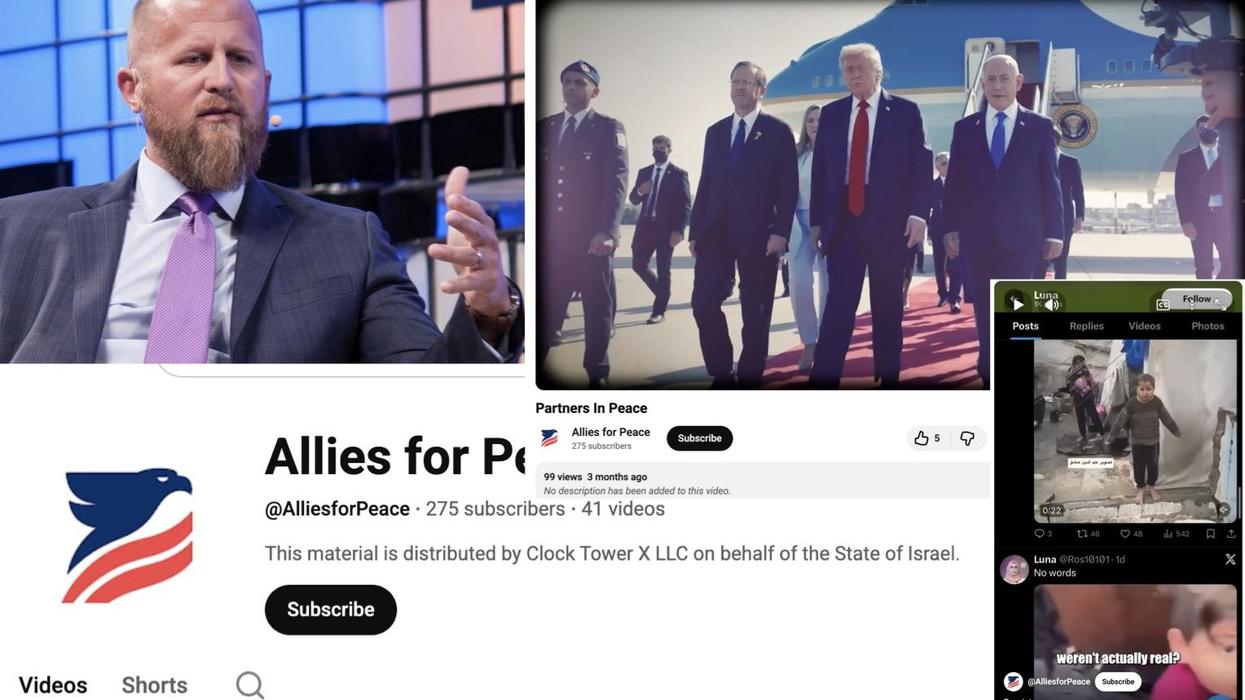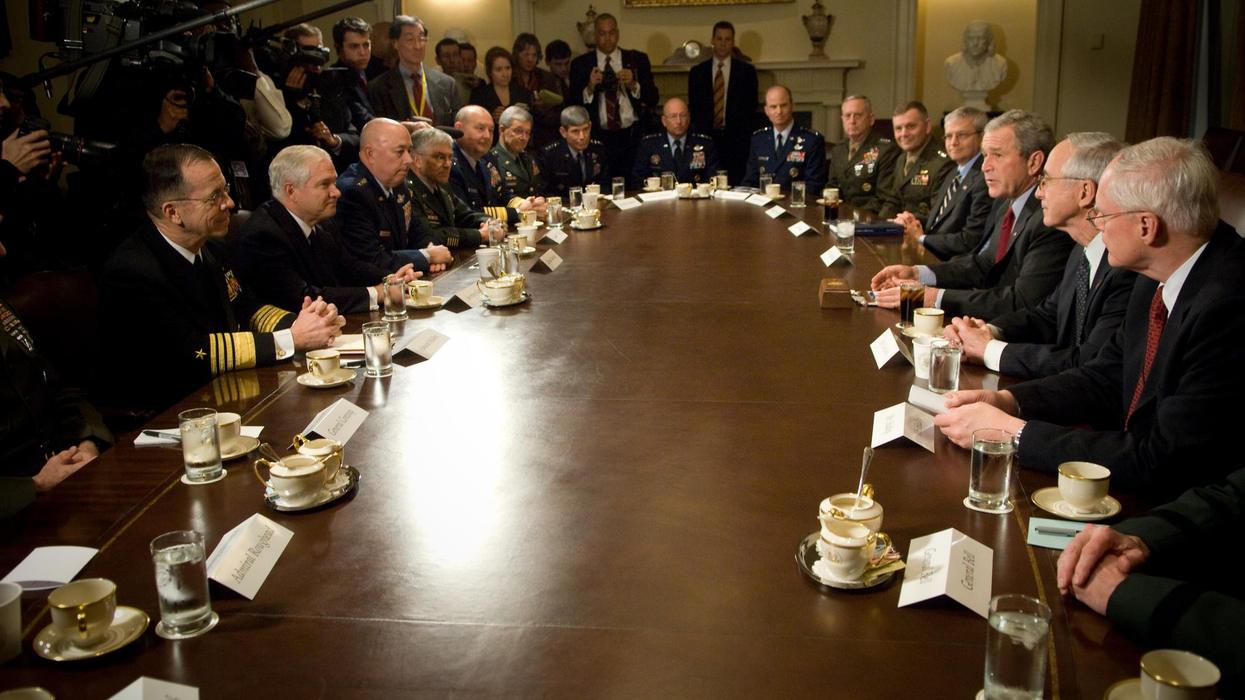In the National Security Powers Act, Senators Chris Murphy (D-Conn.), Mike Lee (R-Utah), and Bernie Sanders (I-Vt.) propose much-needed steps towards Congress reclaiming its Constitutional authority over waging war, imposing sanctions, and regulating arms transfers. If passed, the bill would limit presidential power that has fuelled decades of forever wars with relatively little congressional oversight.
Until now, the judiciary in fact has constrained how Congress checks presidential power, further expanding the Executive Branch’s considerable latitude in foreign affairs. It did this with a ruling in a 1983 Supreme Court case called INS v. Chadha, tipping the scales in the president’s favor.
The landmark case began with a sympathetic set of facts. Jagdish Rai Chadha overstayed his student visa. Born in Kenya to Indian parents, neither country recognized him as a national. Chadha was a British citizen, but in 1971, Parliament limited the right to live in the UK to people with ties to the country. Chadha was functionally stateless. Therefore, instead of deporting Chadha, an immigration judge found deportation would cause him extreme hardship and suspended his deportation under the Immigration and Naturalization Act. The Act delegated to the president Congress’s authority to “establish an uniform Rule of Naturalization” and allowed the Attorney General to suspend a deportation. However, the House of Representatives could override an executive suspension of deportation by passing a resolution vetoing the suspension.
The House passed such a resolution, ordering Chadha’s deportation. Chadha appealed to the Supreme Court, claiming the House’s veto was unconstitutional. Seven justices agreed. In the majority opinion, Chief Justice Burger found that the House’s veto amounted to a legislative action for which the Constitution requires bicameralism (input from both houses of Congress) and presentment (sending the legislation to the president for signature or veto).
What began as an immigration case helped expand the Executive Branch’s national security powers. The Supreme Court’s Chadha decision invalidated “legislative veto” provisions in many laws that maintained congressional oversight over the executive branch’s exercise of delegated powers. Justice White noted in his Chadha dissent that the decision “sound[ed] the death knell for nearly 200 other statutory provisions.” Congress could delegate powers to the president, but reasserting control in specific instances would require a vote in both chambers and a presidential signature. Because the president would presumably veto congressional efforts to undo their decisions, Congress needs two-thirds of each chamber to override a presidential veto.
As trust in government plummeted in the 1970s amid the Vietnam War and the Watergate scandal, several laws aimed to reel in presidential conduct on foreign affairs issues, clarifying presidential authorities, and using legislative vetoes to maintain congressional control. These laws — each of which the National Security Powers Act seeks to reform — are among the most important tools in the president’s foreign policy toolbox.
The War Powers Resolution of 1973 reasserted congressional war authority after President Nixon’s secret bombing campaign in Cambodia during the Vietnam War. The resolution requires the president to report to Congress instances where the president introduces the armed forces into hostilities and requires the end of unauthorized hostilities after sixty days. In his dissent, Justice White referenced a provision of the War Powers Resolution that allows Congress to terminate the use of the military in an armed conflict with a concurrent resolution, which does not require the president’s signature. Although the provision stands, its constitutionality remains in question after INS v. Chadha.
The Arms Export Control Act of 1976 allowed the president to control the import and export of defense equipment, delegating part of Congress’s commerce authority to the executive. Concerns about arms sales escalated when Congress caught wind of President Nixon’s secret sale of advanced military equipment to Iran, Kuwait, and Saudi Arabia. The Act required the president to notify Congress of arms sales exceeding a certain value and allowed Congress to block an arms sale with a majority vote in both chambers. In 1986, Congress amended the Act to require a presidential signature to stop a president’s arms sale, bringing the legislation into compliance with Chadha.
The International Emergency Economic Powers Act (IEEPA) of 1977 also delegates part of Congress’s commerce authority, allowing the president to exercise sweeping sanctions powers “to deal with any unusual and extraordinary threat, which has its source in whole or substantial part outside the United States, to the national security, foreign policy, or economy of the United States,” pursuant to the declaration of a national emergency. The declaration of a national emergency, too, was checked by legislative veto in the National Emergencies Act of 1976. In 1985 Congress amended the National Emergencies Act to require a presidential signature to terminate a national emergency declared by the president. The vast majority of national emergencies in recent decades resulted in IEEPA sanctions to block transactions or freeze assets. The use of sanctions as a tool of first resort in foreign policy has come under increased scrutiny as over thirty national emergencies authorize sanctions around the world.
Each of these laws included failsafes: Congress could pass a concurrent resolution, a resolution with a majority of votes in both houses that need not be presented to the president, to override a presidential exercise of their authority specified in the relevant law.
After Chadha, however, Congress amended the Arms Export Control Act and National Emergencies Act to require joint resolutions, meaning that overriding the president’s exercise of the authority Congress delegated to them requires a presidential signature. In practice, Congress needs supermajorities in each chamber to reassert its authority.
The consequences of this requirement came to the fore in 2019, when President Trump vetoed bills terminating his U.S.-Mexico border emergency and ending U.S. involvement in the Saudi-led war in Yemen. Congress failed to garner enough votes to override either veto. After delegating authorities to the president, Congress’s hands are all but tied. With little oversight, the president can exercise immense powers that the Constitution assigns to Congress, the branch most disposed to public deliberation and, in principle, most accountable to voters. In practice, this has meant spending U.S. military funds on a border wall to fulfill an anti-immigration campaign promise, and prolonging American complicity in war crimes in Yemen.
Increasing congressional oversight is not a silver bullet for drawing down American militarism. Congress has led the United States into open-ended conflicts that have spelled disaster for civilians who suffer the consequences and national interests that fall by the wayside. However, when Congress and the president diverge, oversight can facilitate more restrained policy that better serves the American people and the world at large.
In the National Security Powers Act, Senators Murphy, Lee, and Sanders propose reforms to the War Powers Resolution, the Arms Export Control Act, the International Emergency Economic Powers Act, and the National Emergencies Act. Such a recalibration, the likes of which we have not seen since the 1970s, is long overdue.
The National Security Powers Act, in effect, makes lemonade from the Supreme Court’s lemons, creating new mechanisms that sidestep Chadha’s presentment stipulation and the bicameral supermajorities it de facto requires. The act would repeal the War Powers Resolution and start from scratch allowing for a joint resolution to remove U.S. forces from hostilities. The joint resolution provision complies with Chadha, and it would run into the same problem as the amended Arms Exports Control Act and National Emergencies Act: the president themself can veto an action meant to hold them accountable, requiring supermajorities in the House and Senate to override the veto.
But the act also includes an innovative safeguard. Invoking Congress’s appropriations authority, it automatically cuts off funding for hostilities if Congress does not pass a joint resolution of disapproval or an express authorization within twenty days. Suppose Congress neither passes a joint resolution of disapproval and overrides an expected veto with supermajorities nor expressly authorizes hostilities with legislation. In that case, the act assumes by default that the hostilities lack congressional approval and pulls funding. Congress’s lack of express authorization would cut-off funding without a new vote. With these mechanisms, the NSPA introduces a presumption against open-ended military engagements and shifts the burden to the president to secure congressional approval.
When it comes to arms transfers, sanctions, and national emergencies, the National Security Powers Act’s authors take a similar approach, shifting the presumption against unilateral presidential action. The Act still allows Congress to terminate an emergency or block an arms transfer with a joint resolution, but, more importantly, it requires Congress to pass a joint resolution to approve an emergency declaration or an arms transfer that meets the law’s threshold.
Where the original Arms Export Control Act and National Emergency Act place the burden on Congress to express its disapproval, the National Security Powers Acts places the burden on the president to secure congressional approval. Therefore, if Congress does nothing, the emergency does not go into effect and the arms transfer is not authorized. This marks a considerable shift from current law, in which congressional silence allows the president to proceed with an emergency declaration or an arms transfer unimpeded.In sharp contrast to the status quo, which has allowed a national emergency from the Carter administration to drag on for nearly forty-two years, the Act also sunsets national emergencies after five years.
In his INS v. Chadha dissent, Justice White described a “Hobson’s choice”: Congress could either retract its delegations of authority to the president, “leaving itself with a hopeless task of writing laws with the requisite specificity to cover endless special circumstances across the entire policy landscape,” or “abdicate its lawmaking function to the Executive Branch.”
The implications of Chadha continue to reverberate, but the National Security Powers Act forges a path beyond the non-choice that Justice White foretold. By creating new mechanisms for accountability and shifting the burden onto the president to secure congressional approval, Senators Murphy, Lee, and Sanders offer an opportunity for Congress to restore its rightful role in key areas of foreign policy.

















